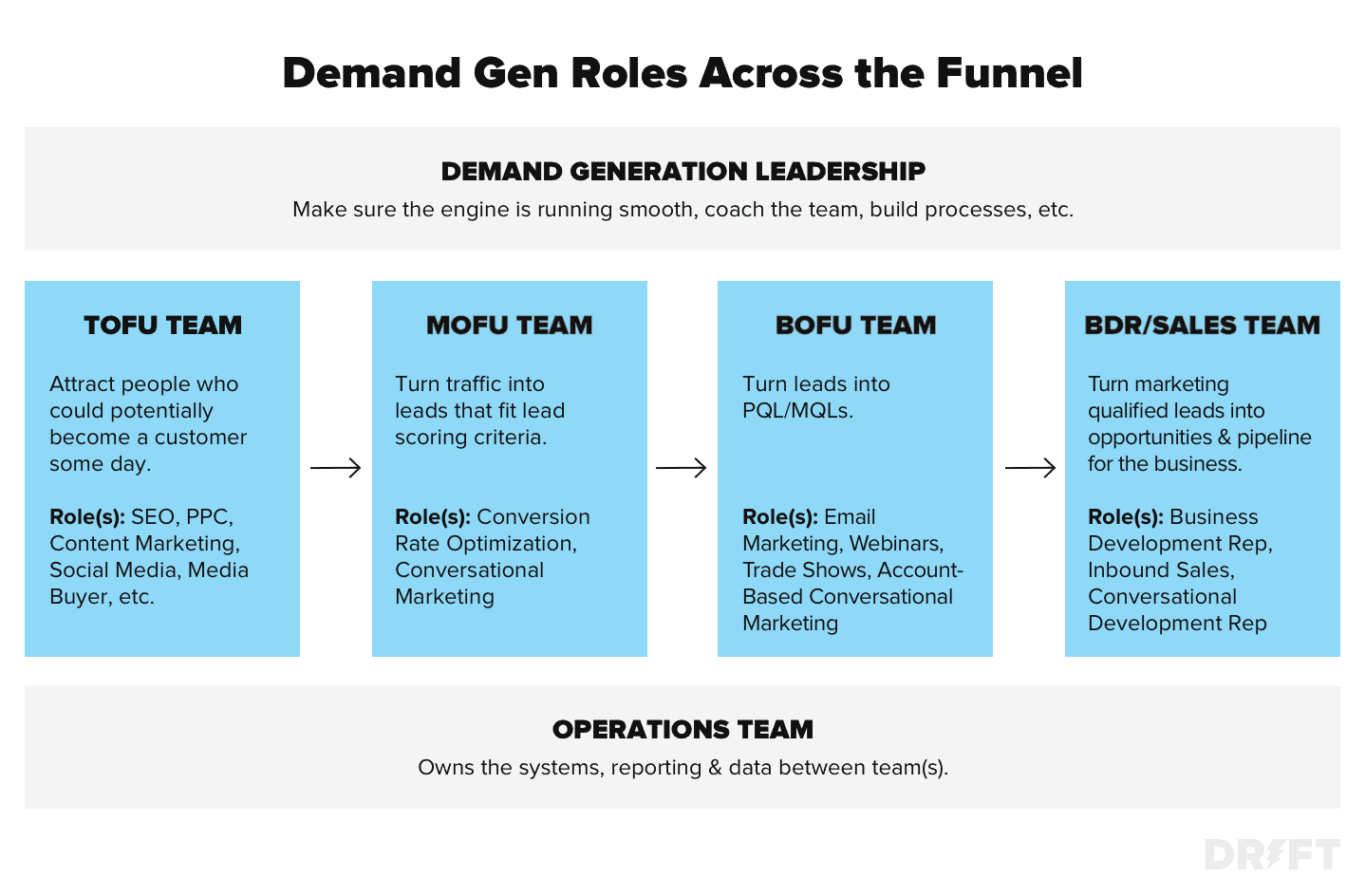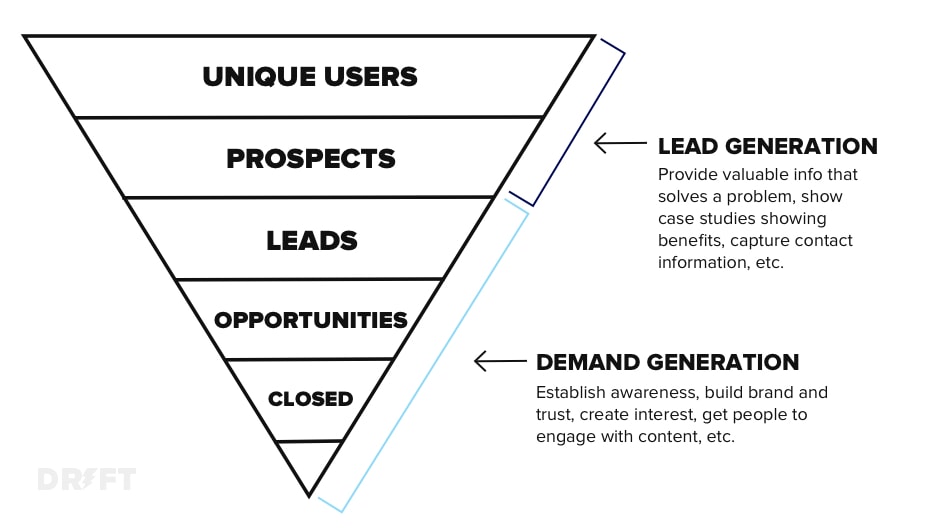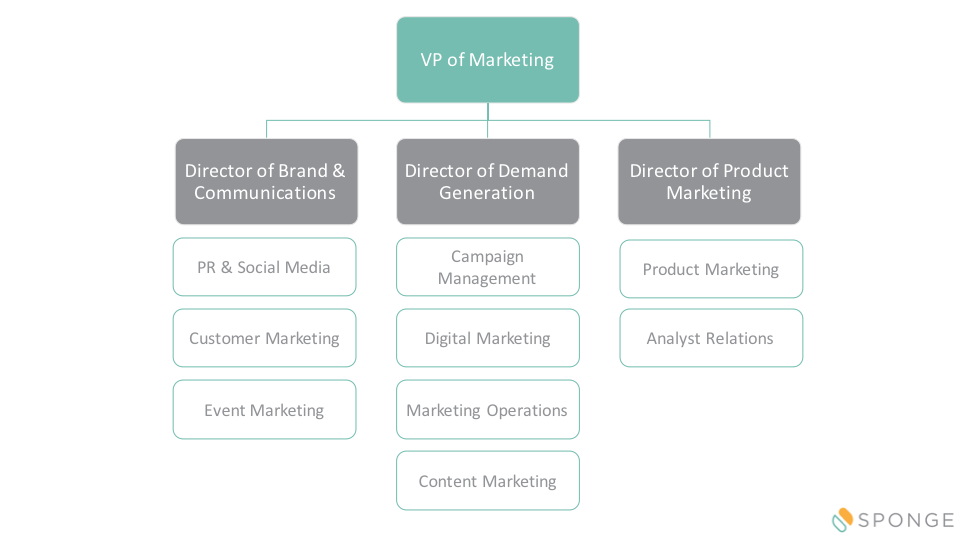Critical Demand Generation Team Roles
There’s no question that demand generation plays a critical role in relating marketing activities to a business’ bottom line. It helps organizations tap new markets, build buzz, and engage audiences, strategically laying down a foundation for nurturing leads into customers that stick around for the long-haul. However, the question of who is responsible for demand generation isn’t quite as cut and dry.
Is it marketing or the sales team’s responsibility?
Because demand generation touches every part of the sales funnel, it’s unrealistic for marketers to handle all demand-related activities without crashing and burning. And while success is tracked against sales-specific KPIs like pipeline value and velocity, revenue, and average deal size, demand generation activities typically fall under the marketing umbrella—content, social media, drip campaigns, and so on.
A dedicated demand generation department can focus on connecting marketing and sales activities to revenue and retention, serving as a bridge between the two teams and ensuring all strategies focus on exceeding customer expectations.
In this article, we’ll dig into the role demand generation plays within an organization and why it makes sense to carve out some space in the budget to hire demand gen experts.
What Does a Demand Generation Department Do?
Instead of defining the funnel in terms of sales, demand marketers think in terms of revenue, applying a holistic approach for driving growth using all of the tools at their disposal–marketing automation, analytics and reporting, a range of campaign strategies, and so on.

The demand generation process is designed to reach potential customers throughout the sales cycle, presenting solutions to customer problems based on their progress in the buyer’s journey.
More specifically, demand gen teams offer the following benefits to their organization:
- Puts Your Brand in Front of the Right Audiences: Demand generation teams dig deep into persona research, helping marketers learn how to articulate the value of your products or services in a way that sparks interest.
- Improves SEO Efforts: Demand generation teams are skilled researchers that can focus their efforts on developing an effective keyword strategy to power your content creation efforts and uncover audience intent. Demand generation researches demographic data, interests, and behaviors, as well as the channels your customers use, the conversations they have on those platforms, and how they interact with your content. They’ll also talk to sales teams about customer pain points, questions, and goals.
- Supports Omnichannel Marketing: Demand generation success depends on building a unified strategy across multiple channels. This goes beyond creating campaigns in multiple places like Facebook, Twitter, Instagram, and so on, content needs to be integrated across touchpoints.
- Supports Continuous Testing and Optimization: Demand generation departments handle testing for different strategies to pinpoint exactly which tactics are working—or not. This includes testing different headlines for email campaigns and Google Ads, messaging for targeted segments, alternate URLs, and more.
While every organization will have a slightly different approach, this example illustrates just how complex demand generation strategies can be.

What Makes an Effective Demand Generation Team?
While driving awareness and creating interest are the cornerstones of demand marketing, demand generation done right also bridges the divide between marketing and sales activities.
Today’s marketers face new challenges, as customers increasingly expect personalized, relevant content and seamless experiences spanning every touchpoint and channel. According to research from MarketingLand, marketers are now expected to focus on KPIs like pipeline influence, MQLs/SQLs, and the number of accounts engaged.

Source: Marketing Land
New technologies and evolving buyer expectations have redefined the relationship between marketing and sales.
Where marketers are responsible for capturing high-value leads and passing them on to the sales team, demand generation is a more holistic strategy committed to driving sustainable consumer relationships and maintaining interest and enthusiasm for the brand.
Where Does Demand Generation Fit in the Organization?
Demand generation is technically part of the marketing department, though it focuses on the strategies that best support a company’s overall sales efforts.
That said, you might think of demand gen as a modern approach to marketing, a sales enablement function, or the strategists powering the sales cycle. In any case, demand gen works closely with both departments, ensuring that marketing efforts and assets deliver the highest return on investment.

Demand generation teams can provide real-time feedback and insights to marketers, allowing them to create content around the kinds of narratives that drive customer loyalty long-term. They also help teams repurpose content for different channels and personas, something that has become increasingly important as content creation becomes ever-more time-consuming and expensive.
Demand generation also plays a role in ensuring the hand-off from marketing to sales to customer success is a positive, consistent experience that sets the stage for retention. Their zoomed-out view enables them to assess the entire customer experience holistically, fix leaks in the sales funnel, and work toward increasing customer retention.
Demand Generation Team Roles
Who you hire and how you structure your demand generation team depends on several factors from budget to which areas require immediate attention. Do you need someone coordinating high-level strategies or a “boots-on-the-ground” demand pro to power up your efforts?

Source: Sponge
Smaller companies might opt to hire a specialist or a manager that works closely with marketing and sales teams, while those with the funding available will benefit more from building out this revenue-driven department.
Here are some examples of typical demand generation positions, with average salary sourced from Payscale data.
VP of Demand Generation
Demand gen VPs are responsible for overseeing all aspects of the demand generation function from the personnel to the technology and infrastructure that supports them. VPs develop the organization’s demand generation strategy to hit revenue goals and drive business, as well as identify new markets for expansion.
They’ll also be responsible for building the systems and processes that track KPIs and continuously demand gen campaign performance. This role requires significant experience scaling demand generation programs, a deep understanding of demand generation metrics, and significant leadership experience.
- Average salary: $179,000
Director of Demand Generation
Demand generation directors are responsible for managing demand for an organization through a range of marketing and sales tactics. Typical duties include leading development, implementing a range of strategies like automated nurture campaigns, SEO, content marketing, and digital PR, and tracking and analyzing the effectiveness of each campaign.
Demand generation directors regularly analyze sales data, reporting their findings to the marketing VP and the rest of the C suite and also work closely with marketing, sales, and sales enablement teams to ensure a message of consistency across channels.
- Average salary: $123,600
Demand Generation Marketing Manager
Demand generation managers are responsible for promoting and raising awareness of a brand and its products or services. Demand gen managers often work in teams to develop new strategies for reaching more consumers and help companies appeal to their target audiences. In this role, managers are responsible for creating market segments and developing campaigns and lead generation strategies for each group. They’ll also connect business objectives to campaigns and define and measure the metrics that prove ROI.
- Average salary: $82,500
Demand Generation Specialist
A demand generation specialist is responsible for leading demand initiatives across multiple channels. They’ll define customer segments and determine the appropriate outreach strategies, work with sales and marketing teams to ensure lead generation goals are being met, and measure campaign results.
Demand generation specialists are typically mid-to-senior level marketers with at least four years of marketing experience that includes content creation and making sense of marketing and sales metrics.
Specialists should have experience with marketing automation tools, CRM software, and running tests.
- Average salary: $55,766.
Can You Outsource Demand Generation to an Agency?
According to a study by Acsend2, just 37% of organizations relied exclusively on in-house talent to manage marketing automation efforts.
As marketing strategies become increasingly complex, we’re starting to see more and more companies move toward a blended model where in-house talent works with outsourced experts as needed. Outsourcing demand gen offers access to broader expertise and a greater variety of skill sets and presents a cost-effective alternative to hiring full-time staff.
That said, outsourcing demand generation isn’t the same as hiring a content writer or an SEO expert, as again, the strategy covers so many touchpoints and channels.
Demand gen success also hinges on a deep understanding of both your audience and how your brand delivers value during every interaction. Demand generation teams are closely connected with sales and marketing, and as a result, in-house teams are preferable to outsourced ones.
So, while you might gain access to industry experts that really know their stuff, they’ll likely face some challenges that in-house demand experts don’t have to contend with. However, you might split the difference and say, hire a demand generation manager in-house as well as an outsourced team that can take on specific tasks.
Your Hiring Checklist for Assembling a Demand Gen Dream Team
If you’re gearing up for a demand generation hiring spree, here’s a checklist of what skills—both soft and hard—to look for:
- Willingness to experiment
- Strong communication skills
- In-depth knowledge of metrics
- Ability to adapt strategies based on data
- Has a customer-centric mindset focused on solving prospect’s larger issues
- Knows their way around the tools of the trade–CRM, marketing automation, social listening platforms, Google Analytics, and so on.
- Experience leading cross-departmental initiatives.
- Bachelor’s degree–preferably in marketing, business or a related field.
- At least five years of marketing experience, preferably in a demand generation role.
Before making any hiring decisions, make sure you have the right setup in place, this includes:
- Processes and documentation
- The tools required for the job
Wrapping Up
Hiring a dedicated demand generation team may be an investment, but it may be one of the smartest investments you can make when it comes to setting the stage for long-term success.
Demand generation teams are continuously testing, optimizing, and uncovering insights, enabling organizations to drive greater efficiency and revenue.
The Anatomy Of An Effective Enterprise Sales Meeting
We asked seven top sales leaders what it takes to open and close a deal. Find out what we learned.